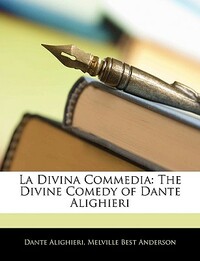Take a photo of a barcode or cover
303 reviews for:
La Divina Commedia: The Divine Comedy of Dante Alighieri
Melville Best Anderson, Dante Alighieri
303 reviews for:
La Divina Commedia: The Divine Comedy of Dante Alighieri
Melville Best Anderson, Dante Alighieri
This central panel in Dante's great triptych brings the sojourner out of the infernal regions of the damned on a journey of purification -- the purgation of sin. Those in purgatory are assured entrance into the paradise awaiting them above, but must first shed their old skins through apropos acts of atonement. This, on the surface of things, describes Dante's journey to reunion with his beloved Beatrice. Along the way, however, the poet creates a dizzying amalgamation of... well, just about everything under the sun, from theology to science to art to the political intrigues of 13th century Italy. And this is where a skilled translator shines.
John Ciardi's translation is clear and direct. However, given the fact that it is not commonly referenced, it must have failed the test of time. He chooses to render Dante's original into enclosed tercets, which makes for relatively easy reading. However, Dante is never a truly easy read, especially given his proclivity for referencing obscure figures both from distant history and from his own age. Ciardi does an exemplary job of illuminating these endless references. The basic problem for any translator is the fact that the explanatory notes will outweigh, in sheer volume, the substance of the original text itself. Thus, even the best translation will amount to a laborious read.
John Ciardi's translation is clear and direct. However, given the fact that it is not commonly referenced, it must have failed the test of time. He chooses to render Dante's original into enclosed tercets, which makes for relatively easy reading. However, Dante is never a truly easy read, especially given his proclivity for referencing obscure figures both from distant history and from his own age. Ciardi does an exemplary job of illuminating these endless references. The basic problem for any translator is the fact that the explanatory notes will outweigh, in sheer volume, the substance of the original text itself. Thus, even the best translation will amount to a laborious read.
Keeping in mind my non-existent knowledge of Italian, and lack of familiarity with any other translations of Purgatorio, I would thoroughly recommend this version to anyone wanting to read the poem. The verse form of the original is not preserved in the translation, but the language is animated and engaging, and surprisingly readable, and the Italian version is supplied on facing pages for comparison. The notes and other additional materials are incredibly helpful and illuminating. They do everything from helping a first-time reader simply get to grips with what's happening, as well as supplying in-depth readings of most lines, informed by historical, religious, and inter-textual research as well as occasional discussion of textual variants and other critics' explanations. If I read Inferno (and I'd like to) I'll definitely seek out the edition put together by Durling and Martinez.
challenging
mysterious
reflective
fast-paced
challenging
slow-paced
Plot or Character Driven:
Plot
Strong character development:
No
Loveable characters:
No
Diverse cast of characters:
No
Flaws of characters a main focus:
Yes
I read this book for a college course on Ancient and Mideval Classics
Purgatorio - The Inferno, but less graphic. Oh, and we discuss the seven deadly sins. That's really all there is to say there.
adventurous
challenging
slow-paced
la pasé mejor que en Infierno pero igualmente se me hacen demasiado largos, ya para el final digo POR FAVOR BASTAAAAA ME QUEMA LA CABEZA pero bueno yo que se está obviamente muy bien escrito y muy lindo el dolce stil novo
adventurous
dark
funny
inspiring
mysterious
reflective
relaxing
medium-paced
inspiring
reflective
slow-paced
Plot or Character Driven:
Plot
Strong character development:
Yes
Loveable characters:
Yes
Diverse cast of characters:
No
Flaws of characters a main focus:
Yes






